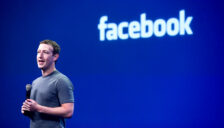Facebook Inc. is offering major record labels and music publishers hundreds of millions of dollars so the users of its social network can legally include songs in videos they upload, according to people familiar with the matter.
The posting and viewing of video on Facebook has exploded in recent years, and many of the videos feature music to which Facebook doesn’t have the rights. Under current law, rights holders must ask Facebook to take down videos with infringing material.

The Campaign Against Facebook and Google’s Ad “Duopoly” Is Going Nowhere
Alex Kantrowitz, writing for BuzzFeed:
For well over a year now, the digital advertising and publishing industries have grappled with the growing power of Google and Facebook, which suck up 98% of every new ad dollar spent online, according to some estimates. With so much growth and power concentrated in just two companies, publishers worry about the viability of their ad businesses, while advertisers bemoan their loss of leverage around ad buys.
Deeply unsettled by the idea of a Google-Facebook duopoly, both groups have done what they can to defend against it. But so far, nothing they’ve done seems to have worked.
It seems so obvious to say that two companies controlling this much of the online advertising market is bad.
Facebook’s Anti-Fake News Initiative May Not Be Working
Sam Levin, writing for The Guardian:
“A bunch of conservative groups grabbed this and said, ‘Hey, they are trying to silence this blog – share, share share,’” said Winthrop, who published the story that falsely claimed hundreds of thousands of Irish people were brought to the US as slaves. “With Facebook trying to throttle it and say, ‘Don’t share it,’ it actually had the opposite effect.”
Mark Zuckerberg Lays Out Facebook’s New Mission Statement
Mark Zuckerberg has outlined a new mission statement for Facebook:
This is a time when many of us around the world are reflecting on how we can have the most positive impact. I am reminded of my favorite saying about technology: “We always overestimate what we can do in two years, and we underestimate what we can do in ten years.” We may not have the power to create the world we want immediately, but we can all start working on the long term today. In times like these, the most important thing we at Facebook can do is develop the social infrastructure to give people the power to build a global community that works for all of us.
For the past decade, Facebook has focused on connecting friends and families. With that foundation, our next focus will be developing the social infrastructure for community — for supporting us, for keeping us safe, for informing us, for civic engagement, and for inclusion of all.
Kara Swisher spoke with Mark over at Recode about the manifesto:
He is particularly concerned about the use of headlines as the only signal to online users. “In most news consumed on paper, the headline is not separate from the content,” he said. “Online the headline is often the only indicator and that is a problem.”
Zuckerberg seems to get how complex it is and how damaging fake news is to the Facebook platform. “Our community wants good information and no one ever said, ‘I want misinformation,’” he said.
Facebook Tries to Offer Music Labels a YouTube Alternative
Lucas Shaw, writing for Bloomberg:
The world’s largest social network has redoubled its efforts to reach a broad accord with the industry, according to interviews with negotiators at labels, music publishers and trade associations. A deal would govern user-generated videos that include songs and potentially pave the way for Facebook to obtain more professional videos from the labels themselves.
Avril Lavigne Asks Mark Zuckerburg to Not Bully Nickelback
Avril Lavigne has posted a response to news that Facebook’s Mark Zuckerburg programed his house AI to never play Nickelback.
Read More “Avril Lavigne Asks Mark Zuckerburg to Not Bully Nickelback”
Facebook Will Start Telling You When a Story May Be Fake
The Washington Post is reporting that Facebook is rolling out some new tools to help tell users when news stories in their feed may be fake:
“We have a responsibility to reduce the spread of fake news on our platform,” said Facebook’s Adam Mosseri, vice president of product development, in an interview with The Post. Mosseri added that Facebook still wants to be a place where people with all kinds of opinions can express themselves. And Facebook has no interest in being the arbiter of what’s true and what isn’t for its billion users, he said.
Google and Facebook to Ban Fake News Sites From Ad Networks
Facebook and Google have decided to ban fake news sites from using their advertising networks. Again, this seems like something that would have been useful a few months ago, but it’s a good step in the right direction.
Google kicked off the action on Monday afternoon when the Silicon Valley search giant said it would ban websites that peddle fake news from using its online advertising service. Hours later, Facebook, the social network, updated the language in its Facebook Audience Network policy, which already says it will not display ads in sites that show misleading or illegal content, to include fake news sites.
Facebook Needs to Get Their Shit Together
The most obvious way in which Facebook enabled a Trump victory has been its inability (or refusal) to address the problem of hoax or fake news. Fake news is not a problem unique to Facebook, but Facebook’s enormous audience, and the mechanisms of distribution on which the site relies — i.e., the emotionally charged activity of sharing, and the show-me-more-like-this feedback loop of the news feed algorithm — makes it the only site to support a genuinely lucrative market in which shady publishers arbitrage traffic by enticing people off of Facebook and onto ad-festooned websites, using stories that are alternately made up, incorrect, exaggerated beyond all relationship to truth, or all three. (To really hammer home the cyberdystopia aspect of this: A significant number of the sites are run by Macedonian teenagers looking to make some scratch.)
Hyperpartisan Facebook Pages Are Publishing False and Misleading Information
However, during the time period analyzed, we found that right-wing pages were more prone to sharing false or misleading information than left-wing pages. Mainstream pages did not share any completely false information, but did publish a small number of posts that included unverified claims. (More on that below.)
We rated 86 out of a total 666 right-wing Facebook posts as mostly false, for a percentage of 13%. Another 167 posts (25%) were rated as a mixture of true and false. Viewed separately or together (38%), this is an alarmingly high percentage.
Left-wing pages did not earn as many “mostly false” or “mixture of true and false” ratings, but they did share false and misleading content. We identified 22 mostly false posts out of a total of 471 from these pages, which means that just under 5% of left-wing posts were untrue. We rated close to 14% of these posts (68) a mixture of true and false. Taken together, nearly a fifth of all left-wing posts we analyzed were either partially or mostly false.
Facebook, what are you doing? This is where a shocking number of people get their “news” and at this rate a huge part of it is literal bullshit.
Facebook Has Repeatedly Trended Fake News
The Washington Post tracked Facebook’s “Trending Topics” section for three weeks. They found a bunch of fake and inaccurate stories.
Our results shouldn’t be taken as conclusive: Since Facebook personalizes its trends to each user, and we tracked results only during work hours, there’s no guarantee that we caught every hoax. But the observation that Facebook periodically trends fake news still stands — if anything, we’ve underestimated how often it occurs.
Maybe it’s time to re-think this whole thing, yeah?
Facebook Fires Trending Topics Staff; Decision Immediately Backfires
Facebook got rid of the human curators for their “trending news” section and then, predictably, had the algorithm shit the bed and surface a fake story:
Facebook cut its Trending Topics team on Friday in favor of employing algorithms to surface news stories on the social networking platform.
Then on Sunday a fake story about Megyn Kelly getting fired by Fox for being a secret liberal showed up among the Trending Topics after getting hundreds of thousands of likes.
The company didn’t take the story down until Monday morning.
Facebook’s Ad Blocking Cat and Mouse
We’ve designed our ad formats, ad performance and controls to address the underlying reasons people have turned to ad blocking software. When we asked people about why they used ad blocking software, the primary reason we heard was to stop annoying, disruptive ads. As we offer people more powerful controls, we’ll also begin showing ads on Facebook desktop for people who currently use ad blocking software.
Two days ago we broke it to you that Facebook had taken “the dark path,” and decided to start forcing ad-blocking users to see ads on its desktop site. We promised that the open source community would have a solution very soon, and, frankly, they’ve beaten even our own expectations. A new filter was added to the main EasyList about 15 minutes ago. You’ll just need to update your filter lists (see below for how).
A source says Facebook is now rolling out the code update that will disable Adblock Plus’ workaround. It should reach all users soon.
UPDATE: @TechCrunch @joshconstine say that FB had a workaround, but there’s already a workaround to that workaround. Just update filters ;)
TechCrunch:
And Facebook has already broken the new workaround from Adblock Plus, which vows to strike back soon.
Push that rock Sisyphus.
Facebook Changing Algorithm to Punish Clickbait
Facebook will be tweaking its news algorithm to start ranking stories that are seen as “clickbait” much lower than others. From Facebook’s blog, announcing this change:
We are focusing more effort on this, and are updating News Feed by using a system that identifies phrases that are commonly used in clickbait headlines. First, we categorized tens of thousands of headlines as clickbait by considering two key points: (1) if the headline withholds information required to understand what the content of the article is; and (2) if the headline exaggerates the article to create misleading expectations for the reader. For example, the headline “You’ll Never Believe Who Tripped and Fell on the Red Carpet…” withholds information required to understand the article (What happened? Who Tripped?) The headline “Apples Are Actually Bad For You?!” misleads the reader (apples are only bad for you if you eat too many every day). A team at Facebook reviewed thousands of headlines using these criteria, validating each other’s work to identify a large set of clickbait headlines.
Good.
How Mark Zuckerberg Led Facebook’s War to Crush Google Plus
Antonio García Martínez, writing for Vanity Fair:
Google Plus was Google finally taking note of Facebook and confronting the company head-on, rather than via cloak-and-dagger recruitment shenanigans and catty disses at tech conferences. It hit Facebook like a bomb. Zuck took it as an existential threat comparable to the Soviets’ placing nukes in Cuba in 1962. Google Plus was the great enemy’s sally into our own hemisphere, and it gripped Zuck like nothing else. He declared “Lockdown,” the first and only one during my time there. As was duly explained to the more recent employees, Lockdown was a state of war that dated to Facebook’s earliest days, when no one could leave the building while the company confronted some threat, either competitive or technical.


